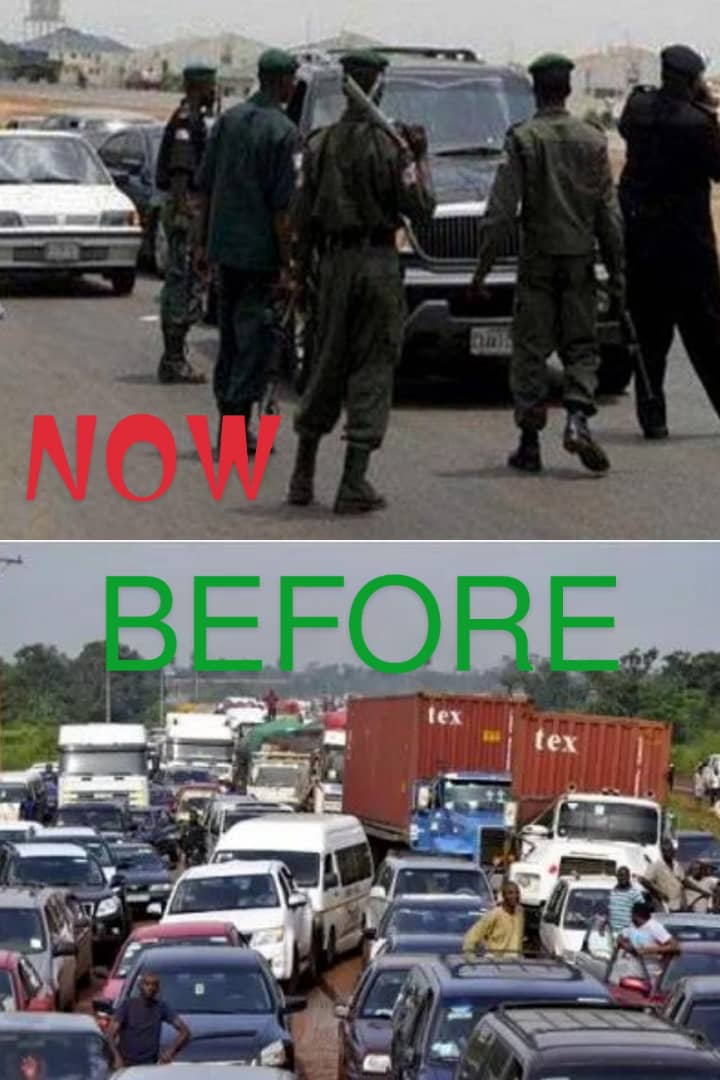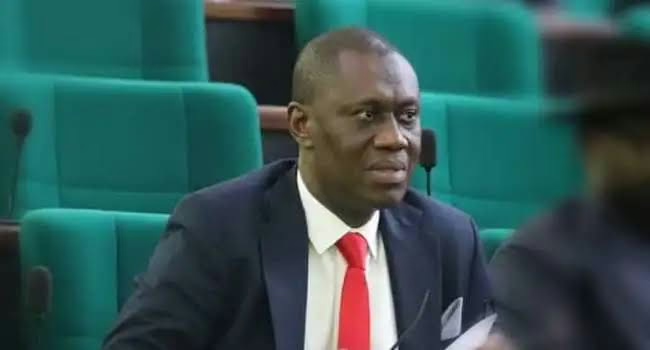By Martins Oloja
I didn’t know where the miracle emanated from. It was a major breakthrough that didn’t hit prominent headlines during the Yuletide to the New Year celebrations: that police and construction firms could withdraw considerably from the Sagamu Interchange to Ore in Ogun-Ondo axis of the federal highways.
The origin of my surpise: Barely a month ago, I travelled to Ajagba, my town in Irele Local Government, Ondo State in the course of planning for the burial of my father who passed on since September, 2021. I was shocked that I physically documented 42 police checkpoints from Sagamu to Ore. It was a harrowing experience I had wanted to write about. I had useful discussions with some police officers at the bumper-to-bumper checkpoints, especially at the Ondo end of the highways. I had enough video coverage of the extortions of motorists, especially vehicles and trucks conveying goods and sundry items. The reasons the officers I politely discussed with gave for the embarrassing 42 checkpoints were hollow, pedestrian and insufferable.
But I was pleasantly surprised when I travelled the same road last week and I could count only three (3) checkpoints on the same highway, specifically at the Ogun State end of the same road. I asked local people what happened? No one could provide any useful hints on the breakthrough. Until I read a response from a Senator representing the South Senatorial Zone in Ondo on the surprise gift to the people in December 2021.
According to a publication on December, 28, 2021, Sen. Nicholas Tofowomo, representing Ondo South Senatorial District in the Senate, commended the new Commissioner of Police in Ondo State, Mr Oyeyemi Oyediran, for removing the illegal checkpoints causing gridlock on the Sagamu-Ore-Benin expressway.
The News Agency of Nigeria (NAN) reported that Oyediran and his team had on the week before, visited the Sagamu-Ore-Benin expressway to dismantle all the checkpoints obstructing the free flow of traffic, thus inflicting pains and frustrations on the commuters plying the axis. Tofowomo, in the statement issued by his Media Aide, Mr Olumide Akinrinlola in Okitipupa then, said that the police boss had started on a good note by ensuring the removal of the illegal checkpoints, as ordered by the Inspector General of Police, Alkali Baba.
While congratulating Oyediran on his assumption of duty in the state, the lawmaker also commended him for changing the image of policing in the state.
He, however, urged him to encourage and embrace community policing, saying that this would assist in his efforts at checkmating crimes and criminal activities in the state. His words: “I congratulate the new CP for changing the image of policing in the state, following the removal of illegal police roadblocks on Sagamu-Ore-Benin expressway which had been causing traffic jams and inflicting pains on commuters and motorists plying the axis. NAN reported that Oyediran assumed duty as the new commissioner of police in Ondo State on Dec. 16, following the retirement of his predecessor, Mr Bolaji Salami.
I would like to say without equivocation that the higher security, police or even political authorities that pulled the strings, which led to the sanity on the highway in December for the first time in years has done a good job. May the grace that propelled the authorities to do what was thought to be impossible continue to egg them on to sustain the order. When I was trying to write about the first experience as a plea to the powers that be, I saw online some articles that had traced the menace through Benin to Onitsha. In fact some other researchers had counted up to 160 checkpoints – from Sagamu to the South-South zone. I had then wondered why the very challenged security and defence authorities had decided to post police and customs operatives to the highways in the South while the North had always been in dire need of the services of these officers in uniform. I had asked why the big guns in Abuja hadn’t thought it expedient to deploy the police and others to the deadly Abuja-Kaduna highways that have claimed lives of so many Nigerians, no thanks to terrorists on the highways. I had also introspected on why the authorities that condoned the massive deployment to the Eastern region haven’t considered management of priorities between the North and the South. The East is also crying aloud about massive deployments to the region where issues of human rights abuses have been widely reported. I wonder why the duty bearers in Nigeria have had to allow larger operations this and that in the South where security threat hasn’t been as remarkable as in the core North (North East and North West).
The issue of ridiculous police checkpoints in the South, especially from Sagamu to the uttermost parts of the South has been on for years. The ticklish point has dominated security briefings and discussion points of the security agencies and the media, a remarkable quarterly parley in recent quarters. The police chiefs have always assured that the menace would be dealt with. Specifically, the police spokesperson assured the media the other day that the authorities would do the needful about the intolerable deployments in the South. It is gratifying to note that there has been a fulfilment of that promise as 42 checkpoints were reduced to only three. Specifically, the notorious point at Omotosho, near Ore in Ondo, which has caused heart-breaking traffic for years was also dismantled in December. The Omotosho gridlock in and out of season has been caused by an mysterious joint task force comprising army and police officers. This is incredible even as most observers in Ore in Ondo believed that the success story I am reporting now would turn out to be an anti-climax and a flash in the pan, after all as the highly lucrative checkpoints would gradually return to the consternation of all. I understand that different police and security formations in the country actually sanctioned the infamous checkpoints from the Apapa Ports to the South South as revenue streams where targets are set.
Meanwhile, before those in office and in power in Nigeria dismiss my pleas for sanity on the highways, they should consider the economic consequences of the painful checkpoints where the operatives collect ‘tax’ from all commercial drivers and vans conveying goods through the highways. These actions worsen inflationary trends on goods and services in ways economic and risk analysts may not be able to capture, in the circumstances.
In May 2019, a thorough investigation by Next Edition digital newspaper “How bribe-taking security operatives, gangs force Nigerians to pay dearly for food (2)” had revealed the implications of checkpoints of extortion by security operatives on the political economy of citizens and business people plying our roads.
The scoop had revealed, “How N5.8billion extortion by security agents, gangs push Nigerian traders through dangerous routes”.
According to the revelation, Nigerian security operatives, fake federal, state and local government revenue officials and gangsters extort over N5.8billion annually from traders conveying livestock from the far North to the country’s South-south and South-east states. With a minimum of 400 truckloads of cattle leaving the North to the 11 South-south and South-east states weekly, traders pay a minimum of N300, 000 per truck in illegal levies, fees and taxes.
The significant inquiry revealed more: In a month, no fewer than 1,600 truckloads of cattle are transported to the two regions and more than 19, 200 truckloads in a year. The Adamawa State Chairman of the Amalgamated Cattle Dealers Association of Nigeria (ACDAN), Inua Abubakar, said livestock dealers part with billions annually in the illegal fees.
“No fewer than 400 trucks loaded with cattle leave the North to the South-south and the South-east every week and our members spend a minimum of N300, 000 per truck on illegal fees, levies and taxes…In a month, over 1,600 trucks convey cattle to the two zones and over 19, 200 trucks in a year…When you calculate how much we pay in illegal fees and levies and taxes per truck along the roads between Adamawa, Taraba, Benue and Cross River, you will understand the cost of extortion we have been shouting about.”
In an undercover report earlier published by the digital newspaper, it was found that a total of 154 checkpoints were mounted along the federal highways linking Adamawa, Taraba, Benue, Cross River and Akwa Ibom states at the time. To carry out the investigation, the newspaper’s correspondent had joined a truckload of cattle from Yola, the capital of Adamawa State, to Uyo, the capital of Akwa Ibom State. That was how the correspondent saw first-hand, how armed gangs, Nigerian Police, Nigerian Army, Nigeria Immigration Service (NIA), Nigeria Security and Civil Defence Corps (NSCDC) and the National Drug Law Enforcement Agency (NDLEA) used checkpoints to fleece traders.
Fake federal revenue officials and others purporting to work for Benue, Taraba and Cross River states also created barricades along the route to charge traders.
According to the investigation then, the only agencies whose operatives did not extort from the truck throughout the journey were the Federal Road Safety Corps (FRSC) and the Nigerian Customs Service (NCS). While the blockage of the highway violates Section 2 (2) of the Taxes and Levies Act Laws of the Federation of Nigeria (2004), the billions collected in the illegal levies and taxes are pocketed by a few persons. Based on the Nigeria’s government budget benchmark, the N5.8 billion extorted from the livestock dealers annually and pocketed by individuals could patch a larger part of the over 900-kilometre pothole-ridden federal highway crisscrossing Adamawa, Taraba, Benue and Cross River and Akwa Ibom states.
Investigation by this newspaper showed the Federal Government ordered the massive deployment of security operatives along the Adamawa, Taraba, Benue and Cross River routes from 2014.
I cannot understand why Senator Tofowomo didn’t include in his statement applauding the police authorities on the dismantling of the checkpoints in December last year that the checkpoints including the deadly Omotosho junction’s should not return. That is the point to be made. I left Lagos by midday last Tuesday before 3pm, I was in my village because of the absence of checkpoints including the ones mounted by unscrupulous construction companies security guards on the Sagamu- Ore-Benin highway.
The conclusion of the whole matter is that the National Security Adviser (NSA) and the Inspection General of Police (IGP) should note that the checkpoints are powerful destroyers of police image. And so revenue consideration should not be placed above the expediency of improving police service and image in the country. We need an efficient and professional police service. We don’t need police as tax and toll collectors on the highways.
Martins Oloja is the Managing Director/Editor-in-Chief of The Guardian Newspaper











Leave a Reply